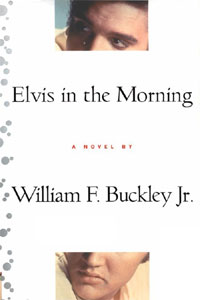Elvis In The Morning By William F. Buckley Jr.
Book

ElvisNews review
When building a fictional narrative around the life of a historical figure, it's important to choose the right figure -- someone who is widely known but about whom there remains an air of mystery, an empty space for the novelist's imagination to fill. If the person had an important social or cultural influence, the author can build on these themes to add weight and resonance to his story. It would be hard to find a better candidate than Elvis Presley.
In Elvis in the Morning, the conservative political columnist William F. Buckley Jr. has created a fanciful yet believable premise -- a lifelong friendship that begins when an American teen-ager living on a military base in West Germany meets Pvt. Presley during the singer's well-known 1950s tour of duty in the Army.
The novel follows the lives of these two central characters through the remainder of the innocent '50s, the turbulent '60s and the party-payback '70s, ending with Presley's death in 1977. With intermittent success, Buckley uses his characters' lives to illustrate the times in which they lived and events ranging from university protests to the beginnings of the computer industry.
Orson Killere is an endearing character, a precocious young man with tortoiseshell glasses and a mop of unruly hair. Orson lives with his widowed mother on a military base in Wiesbaden, West Germany, where she works in an administrative position.
During a visit to the United States in 1956, 11-year-old Orson sits down one evening to watch Presley's national television debut. His reaction, as described by Buckley, is perhaps emblematic of the young singer's influence on a generation of Americans:
Four minutes later Orson thought it was the end of the world: Nothing, ever, could match the excitement he felt. The rapturous sound, the beat, the joy on the godlike face of the performer. That man saying: `Do what you want to do and enjoy, and don't give a [expletive] what others say.' That, Orson knew, feeling the sense of the fugitive word he had just learned -- that was the sentiment Elvis Presley obviously had in mind when he sang I Got a Woman.
Three years later, back in Wiesbaden and deeply influenced by the socialist views of his history teacher, Orson decides his idol's music should be considered community property, like air and water. On a winter night he breaks into the post PX, takes 20 copies of the Elvis' Golden Records compilation and is about to slip back out when the lights flash on and four military policemen -- alerted by an alarm the boy had not counted on -- confront him.
Orson's escapade makes the pages of Stars and Stripes and thus comes to the attention of Presley, stationed nearby. Intrigued by his young fan's dedication, Presley drops by the Killere home unannounced and gives the boy and his best friend, 14-year-old Priscilla Ann Beaulieu, a private concert. Thus begins, in this blend of fact and fiction, Presley's friendship with Orson and his courtship of the girl who would become his wife.
The story jumps forward a few years to find Orson enrolled at the University of Michigan, plotting rebellion. The anti-capitalist seeds planted by his teacher in Germany find fertile soil on an American campus in the mid-1960s, and Orson is planning a protest that involves students' handcuffing themselves together to prevent university trustees from leaving the administration building. The plan falls apart when the officials use an exit Orson didn't know about. Orson is expelled.
Orson rather quickly loses his revolutionary ideals and with them, frankly, much of his charm as a character. It's not unreasonable that a young man's outlook would change with hard experience. Yet as Buckley shepherds Orson through a succession of roles -- young wanderer, lover, husband and father, computer start-up firm employee -- he scarcely resembles the young man we got to know in the first few chapters. He remains sympathetic, more or less, but becomes far less interesting.
Orson continues to talk to Elvis periodically and occasionally to see him. Orson provides career advice and tries to help Elvis and Priscilla -- who by now is Mrs. Presley -- through rough patches in their relationship. But his efforts fail to prevent Presley's self-destruction, and Orson watches as his idol succumbs to drugs, obesity and the demons lurking within his own genius.
If Elvis in the Morning is intended as a parable of the times in which its characters lived, it is only moderately successful. In its first 20 chapters, Buckley shows vividly how Presley's music nudged a generation of Americans toward the '60s counterculture and its aftermath. In the succeeding 40 chapters he does a poorer job of exploring what happened after that, and why it matters.
Source: Houston Chronical
